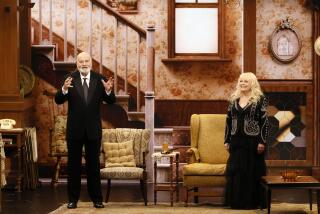Young Provided a Dose of Comfort
- Share via
WASHINGTON — On television, Robert Young was more than an actor, more than a star, more even than an authority figure. He was a reassurance man. The ideal dad he played on “Father Knows Best” and the flawless doctor he later portrayed on “Marcus Welby, M.D.” helped comfort the audience at home and ease the anxieties of life in the atomic age.
When TV became more realistic in the ‘70s and ‘80s, when entertainment shows addressed social issues and presented characters with flaws and failings, pharmacology came up with drugs like Valium and Prozac to perform somewhat the same function that escapist TV had done in the ‘50s.
“Father Knows Best” and “Marcus Welby” were shams, but they were comforting shams, sometimes moving and inspiring, all the more so because of Young, who wore the roles like comfy cardigan sweaters. He had an easygoing charm that was perfect for the intimate medium of TV, but he also brought enough ingratiating authority to the parts he played to make them seem credible and genuine.
Young died late Tuesday in his Los Angeles-area home at the age of 91, four years after losing his wife, Betty. Their marriage had lasted six decades, a true rarity by Hollywood standards. It may not have been as carefree as the union of Jim and Margaret Anderson, the couple Young and Jane Wyatt played on “Father Knows Best,” but its longevity speaks for itself.
It survived, among other crises, years in which Young suffered from alcoholism and depression. He attempted suicide in 1991, four years after appearing in “Mercy or Murder?,” a TV movie in which he played a man who helped his terminally ill wife end her own life. Robert Young, Jim Anderson and Marcus Welby were not the same man, but when we watched Young play the roles, he seemed naturally suited and completely at home.
We wanted to believe and we did believe.
In Jeff Kisseloff’s “The Box,” a fascinating book of remarkably candid interviews with talent from TV’s first generation, Young complained, “I wasn’t Jim Anderson, but it was hard for the public to accept that, and it got to be a pain. . . . People did perceive it as real life. I know that. I don’t know if people compared themselves unfavorably to us, but maybe it helped with the realization that a family can exist without killing each other.”
Billy Gray, who played the adolescent son, Bud, on the show, remained bitter for years afterward about what he considered the essential dishonesty of the program’s depiction of a typical American family. “It was as if we were in a vacuum or some kind of enchanted forest,” he told Kisseloff. “It wasn’t taking into account the reality of the world. It was an advertiser’s vision of what the world should be.”
But in the context of its times, “Father Knows Best” was actually one of the gentler and more humane family sitcoms. When Young created the show for radio in 1947 with partner Gene Rodney, he wanted it to be a cut above the usual wacky fare: “I said, ‘Gene, I’d like to do a family show. I’d like to be the father, but not a boob. I don’t want to do William Bendix on ‘The Life of Riley.’ Out of that came ‘Father Knows Best.’ ”
Young’s original title for the series included a question mark. It was to be “Father Knows Best?” because Young thought that ironic and said everyone knew mothers were the real heads of households anyway. But the sponsor, a cigarette company, refused, and the deal would have fallen through if Young hadn’t relented and agreed to drop the question mark. Thus was Jim Anderson granted omniscience.
As a doctor on “Marcus Welby” (1969-76), which co-starred then-newcomer James Brolin, Young was back in the reassurance business, imparting wisdom, comfort and hope to Welby’s patients and to viewers at home. Maybe the programs were glossy and simplistic, but Young gave them stature and veracity and for that became immensely popular and widely loved.
Whether he was the greatest actor in the world was irrelevant. The important thing was that Robert Young was bound to leave you in a better frame of mind than he found you. If he’d lived another 91 years, he could never have met all the people whose lives he’d touched and whose spirits he’d lifted and who felt grateful for having known him.
More to Read
The complete guide to home viewing
Get Screen Gab for everything about the TV shows and streaming movies everyone’s talking about.
You may occasionally receive promotional content from the Los Angeles Times.





